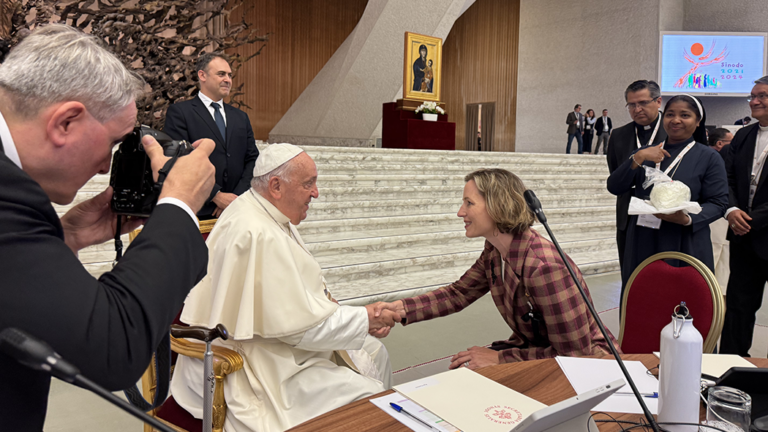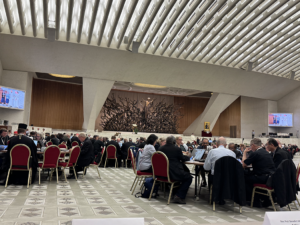
All in the Hall: An insider’s reflection on the Synod on Synodality
Editor’s note: Tricia C. Bruce, Ph.D., is an IACS Affiliated Research Scholar and sociologist of religion with expertise in organizational, attitudinal, and generational change. She was appointed by Pope Francis as a consultor to the General Secretariat of the Synod, a body of bishops and other appointees helping prepare and implement themes identified within the Synod on Synodality — the multi-year, global conversation discerning future directions in the global Catholic Church. Her reflection below is the first in a four-part series.
I didn’t live through Vatican II, but it lived through me: I rang the bells as an altar girl in elementary school, joined the “guitar” choir as an adolescent, found BFFs among Protestant PKs (“pastor’s kids”) and boasted my “People of God” status into young adulthood. Vatican II was both a question and an answer when I tackled my dissertation-turned-first-book, a deep dive into the lay Catholic movement Voice of the Faithful as it mobilized legions of mostly-Baby Boomers amid revelations of abuse by clergy.
Vatican II was the Church I learned to know – and learned to ask about – as a Catholic sociologist of religion.
Fast forward a few academic degrees, books, articles, reports, and accolades across decades studying the social dynamics of US Catholicism — to the day I received an email from the Vatican inviting me to serve as Consultor to the 2021-2024 Synod on Synodality.
Consultor?
Synod on Synodality?
Was this my Back to the Future moment, carrying me through the winds of early 1960s aggiornamento? COULD IT BE that changes were underfoot in the Church today, and I’d just been invited to be a small part of it?

I admit that I stumbled over even the word “Consultor” before I appreciated it as common parlance for advisors to bishops – most of whom, historically, have been men – mostly priests – and decidedly not sociologists nor lay people nor married mothers with Ph.Ds and a penchant for barre classes and vanilla lattes, like myself.
No, we sociologists are usually the ones peering through the window or lingering in the parking lot, asking hard and sometimes uncomfortable questions with even harder and less comfortable answers. Questions about Catholics’ beliefs and behaviors, experiences of belonging or exclusion, politics, abuse, inequality, roles, race, gender, and more. The kinds of questions that the late priest-sociologist Joseph H. Fichter said got him “in trouble.”
But if we know anything by now about Pope Francis, it’s that he likes trouble – good trouble –trouble that steers the Church away from clericalism and toward the “smell of the sheep.”
My “yes” assured I was there for the October 2024 final assembly of the Synod on Synodality – there with Pope Francis, there with some 350 delegates from around the globe, there with the awe and energy of a Church asking itself anew about communion, participation, and mission. Those three guiding words adorned the lanyard around my neck – the magical badge that got me through throngs of Vatican tourists, past colorful Swiss guards, and into the Paul VI Audience Hall day after day.
Communion, participation, and mission. Those three guiding words adorned the lanyard around my neck – the magical badge that got me through throngs of Vatican tourists, past colorful Swiss guards, and into the Paul VI Audience Hall day after day.
The Hall was todos, todos, todos: Bishops, Cardinals, religious sisters, young people, canon lawyers, diocesan administrators… coffee, croissants, tiny donuts… rotating cameras affixed to roundtables…me, at a rectangular table in the back with a “Professoressa Tricia Bruce” placard and direct line of sight to the pope. The pope?!!
And so the global, multi-stage, multi-year Synod on Synodality ambled ahead to enliven a “Synodal Church” with a real-life, questioning, imperfect, Vatican II imbibed sociologist in its midst – me – ever attentive to the deeply human character of a deeply spiritual synodal enterprise.
And human, it was.
To learn more about Dr. Bruce and her work, visit: https://triciabruce.com/
More in the series:
Where Women Sit: An Insider’s Reflection on the Synod on Synodality
About the Pope: An Insider’s Reflection on the Synod on Synodality